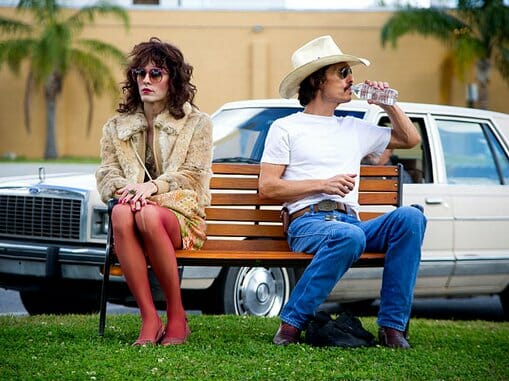Dallas Buyers Club

More often than we’d care to admit, our noble deeds are products not of kindhearted altruism but, rather, of self-centered desires. (For example, some give money to charity because it makes them feel good about themselves and gets them a tax write-off—and, hey, if it actually helps people in need, well, that’s certainly nice, too.) You don’t have to be a cynic to be disappointed that this essential reality is missing in a lot of inspirational Hollywood dramas based on true stories: They deify their subjects without always investigating the complicated reasons behind their selfless acts. This isn’t to say that these people were disingenuous in their actions—simply that righteousness isn’t always the sole motivating factor.
Despite some feel-good conventionality, Dallas Buyers Club succeeds thanks to its pragmatic view of its rather pragmatic hero. Inspired by true events, the film stars Matthew McConaughey as Ron Woodroof, who in the mid-1980s was living in Dallas and happily screwing every woman in town when a trip to the doctor uncovered that he was HIV-positive. A man’s man—in other words, a small-minded homophobe—Woodroof initially refuses to believe the diagnosis since he’s not gay, but after being told he has about 30 days to live, he focuses his energy on seeking out drugs that can help him survive.
Woodroof’s quest leads him to Mexico, where he finds effective medications that aren’t approved in the U.S. To change this, he hits upon the idea of starting a group in Dallas in which fellow HIV-positive individuals can pay monthly dues to him for unlimited amounts of these pills they can’t legally buy in the States.
Directed by Jean-Marc Vallée (The Young Victoria, C.R.A.Z.Y. ), Dallas Buyers Club works best as a matter-of-fact exploration of Woodroof’s unexpected entrepreneurial ambitions. The true story has plenty of juicy intrigue—a homophobe becomes a hero to the gay community, an ordinary man becomes a sort of drug smuggler—but Vallée largely deemphasizes those elements to ground his film in an everyday nonchalance.
That’s appropriate because, as portrayed in Dallas Buyers Club, Woodroof isn’t a man who suddenly saw the error in his attitudes about homosexuals. Instead, his journey to tolerance is muted and somewhat reluctant. Dallas Buyers Club doesn’t judge him for this—it understands that these slow, incremental steps are how social change usually comes about.
-

-

-

-

-

-

-

-

-

-

-

-

-

-

-

-

-

-

-

-

-

-

-

-

-

-

-

-

-

-

-

-

-

-

-

-

-

-

-

-








































